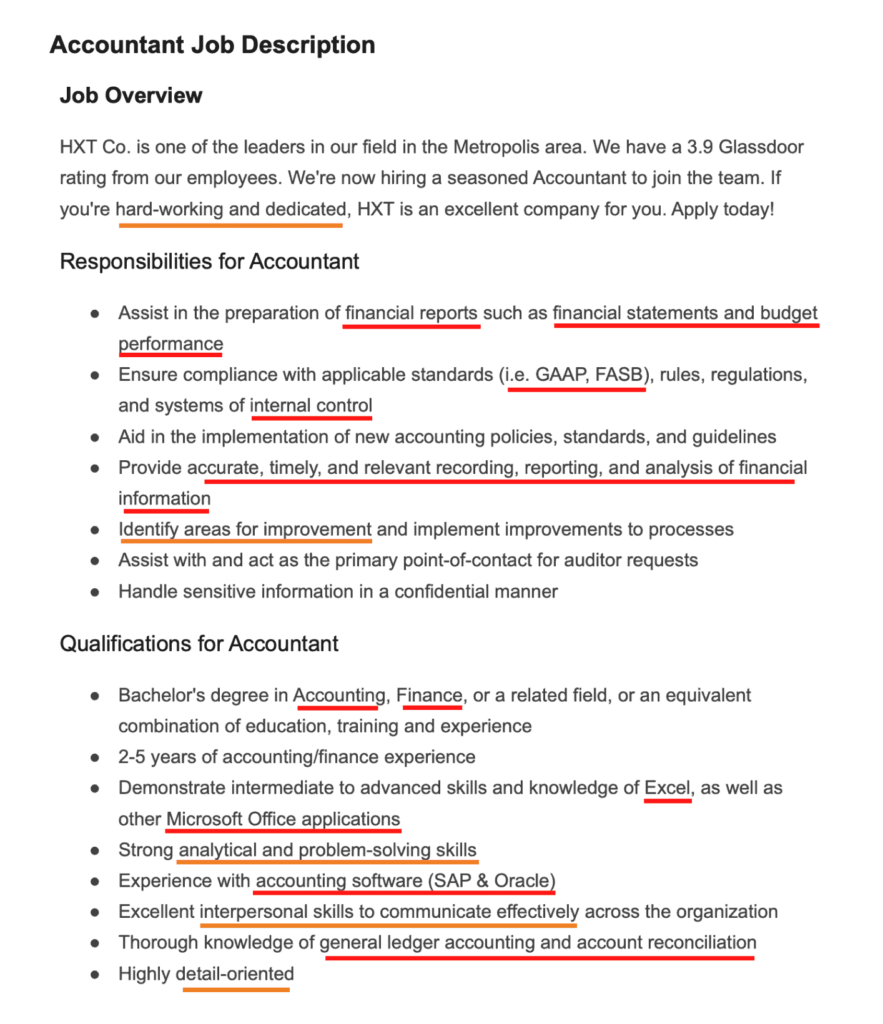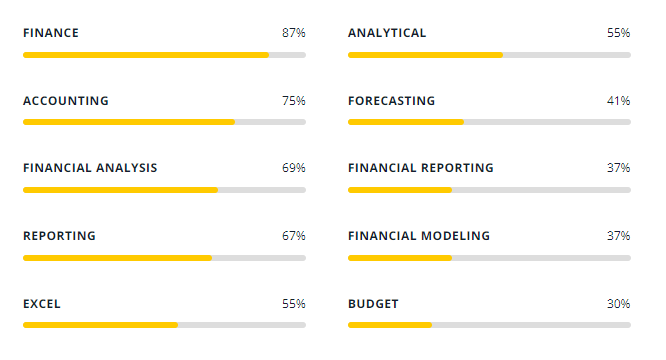Your hard skills are more important than ever. This is because of a growing trend in the world of recruitment called skills-based hiring. This approach emphasizes a job candidate’s skills and abilities over their education or work history.
According to a LinkedIn report, 75 percent of hiring managers say that skills-based hiring will be a priority at their company in the coming year.
In this article, we’ll tell you everything you need to know about hard skills: what they are, why they’re crucial for your career, and how you can develop them.
Plus, we’ll provide you with plenty of examples to help you understand how to apply hard skills in real-world situations, as well as how to feature them on your resume.
What are hard skills?
Hard skills are knowledge or expertise that you learn them through education or on-the-job experience. A skill is considered hard if it can be easily measured or tested.
Hard skills include things like data analysis, video editing, computer programming, or speaking a foreign language.
In a world that is becoming increasingly specialized, possessing hard skills enhances your employability. They show that you have the practical knowledge and technical ability to do the job.
Hard Skills examples
Here are some of the most in-demand hard skills in the job market right now:
- Bilingual or multilingual
- Adobe software suite
- Network security
- SEO/SEM marketing
- Statistical analysis
- Data mining
- Programming languages (like Perl, Python, Java, and Ruby)
- Payroll accounting
- Microsoft Excel
- Video editing
- Salesforce
- Heavy equipment operation
- Graphic design
- User experience (UX) design/User interface (UI) design
- Google Analytics
- Auto repair
- Photography
- Social media and marketing management
- Blog writing
- Project management
- Event planning
Hard skills vs. soft skills
While hard skills can be learned in class or on the job, soft skills are personal attributes that help you work with other people. In fact, soft skills are often called “people skills”.
Soft skills include communication, time management, organization, collaboration, and critical thinking.
Soft skills are also transferable. This means they can be used in any type of job in any field. This isn’t the case with hard skills.
Hard and soft skills are different, but both are important. Having a variety of hard and soft skills on your resume shows you’re a well-rounded candidate.
How to find hard skills to put on your resume
How do you know which hard skills you should add to your resume? Just read the description of the job you’re applying to.
Here’s an example of a job description with some important skills and requirements underlined:

If you were applying to this job, adding the underlined hard skills to your resume would greatly increase your chances of getting an interview.
Adding the right skills to your resume is crucial these days because most companies use applicant tracking systems (ATS) to streamline the hiring process.
When you submit your application it goes right into an ATS database. Hiring managers then search through the database for suitable job candidates by typing in keywords. These keywords are usually skills or job titles.
If your resume contains the keywords, or skills, the hiring manger is searching the ATS for, it will be found. If your resume doesn’t contain these keywords, it will remain in the database, unseen.
How to tailor your resume
The rise of applicant tracking systems have made it more important than ever to tailor your resume. This means highlighting the skills and experiences that are relevant to a particular job opening.
Most job seekers create one resume that they send out with every application. But a single resume won’t contain the right keywords for most jobs. This prevents hiring managers from finding it as they search the ATS.
Tailoring your resume for each job will get you better results. Unfortunately, it’s also time consuming. That’s why most people don’t do it.
To speed up the process, you can use an online tool like Jobscan’s resume scanner. This tool will allow you to create more highly-targeted resumes in less time.
To use the tool, just paste both your resume and the job description into the scanner and click “scan”. You’ll then receive a Match Report that shows exactly which keywords you should try to add to your resume to get that job.
Here’s an example of a Match Report that analyzed a resume and the job description for a medical administrator:

As you can see, while the resume that was analyzed does include important hard skills like “auditing” and “patient care”, it’s missing the most important hard skill of all, which is “billing”.
You must add the keyword “billing” to your resume if you want to get this job!
There’s no guesswork when you use Jobscan’s resume scanner. It tells you exactly how to optimize each resume you send out so it has the best chance of being found, and read, by a hiring manager.
Hard skills by job title
We analyzed over 10 million real job descriptions to find the top hard skills for a variety of job titles. We then sorted these skills by the percentage of job descriptions that list each skill.
Below are the most commonly required hard skills for 10 job titles. To see the full reports for all 27 job titles that we analyzed, click here.
1) Account manager hard skills
Account managers work in sales and marketing, finance, healthcare, and more. These skills focus on how to strengthen a company’s relationships with customers and clients and troubleshoot any issues. (See full Skills Report).

2) Business analyst hard skills
Business analysts find insights, patterns, and solutions to help businesses succeed. Recruiters look for these skills when hiring, along with working under pressure and interpreting data. (See full Skills Report).

3) Data engineer hard skills
Becoming a data engineer involves building and maintaining data quality to make sure it’s accurate and reliable. It means you’ll need analytical and programming skills. (See full Skills Report).

4) Executive assistant hard skills
To succeed as an executive assistant you need skills in completing administrative duties and managing tasks. You also have to be able to respond quickly and be easy to reach on a regular basis. (See full Skills Report).

5) Financial analyst hard skills
Financial analysts help organizations and businesses make the best financial decisions possible and achieve their financial goals. You could work in corporate, investment banking, and consulting. (See full Skills Report).

6) Graphic designer hard skills
Graphic design hard skills focus on feeling comfortable with Adobe software, showing you’ve mastered it through your profile and projects. (See full Skills Report).

7) Marketing manager hard skills
When applying to a marketing manager position, obviously it’s important to understand the ins and outs of marketing. This includes developing marketing strategies, analyzing sales and campaign performances, and guiding and managing the rest of your team. (See full Skills Report).

8) Pharmacy technician hard skills
Pharmacy technicians work with customers on a regular basis, preparing prescriptions and providing them with essential information. You’ll likely work in a hospital, lab, or pharmacy setting. (See full Skills Report).

9) Product manager hard skills
Being an effective product manager means creating competent product roadmaps and strategies. It’s also beneficial to understand web development and other related technology to relate to your engineering team. (See full Skills Report).

10) Teacher hard skills
Teaching skills require educating your students and helping them grow. You need to be comfortable with your subject matter, creating and executing lesson plans, and assessing students’ performance. (See full Skills Report).

Where to feature hard skills on your resume
There are four resume sections where you should try to add your hard skills:
1) Resume headline
Your resume headline is a one-line phrase located at the top of your resume, right beneath your contact information. The purpose of the headline is to quickly tell the hiring manager who you are.
Here’s an example of a resume headline with the hard skill “bilingual” in it:

2) Resume summary
Your resume summary appears right beneath your resume headline. Your summary is a brief statement that highlights your skills, experience, and achievements.
Here’s an example of a resume summary that features a variety of hard skills:

3) Skills section
The most obvious place to put your skills on your resume is your skills section. We recommend placing this section after your summary and before your work experience section.
You can either use bullet points to list your skills, or you can separate them by vertical bars (|) or some other separator. Here’s an example:

4) Work experience section
The work experience section is the heart of your resume and a great place to add your hard skills.
Always try to start each bullet point with an action verb, such as “Implemented”, “Initiated”, or “Spearheaded”. Whenever possible, try to use numbers and metrics to describe your accomplishments.
Here’s an example of a work experience section with plenty of hard skills:

How to develop your hard skills
While you can learn hard skills by pursuing a degree or working, you can also teach yourself.
There are plenty of resources, like online courses, assessments, and certifications. These enable you to acquire new skills at your own pace and convenience.
For more information about online courses and certifications, read:
FAQs
Examples of hard skills include data analysis, programming, graphic design, foreign language proficiency, machine operation, SEO, marketing, project management, accounting, social media management, and cybersecurity.
Some hard skills might be considered easier to learn because they may require less time to understand the basics or have more accessible learning resources available. Here are a few examples:
• Computer skills
• Social media management
• Data entry
• Office software
• Customer Service software
• Basic math
• Language proficiency
• Email communication
• File management
• Basic graphic design
First, identify the skills pertinent to your career or interests. Then enroll in online courses that teach those skills, attend workshops, and read relevant books and articles. You can also earn certifications to show employers that you have learned the skills they require.
Hard skills are learned skills that are job specific. They tend to be more technical, and they’re necessary for completing day-to-day work.
Soft skills focus more on characteristics and personal attributes, like teamwork, communication, and time management. They translate across most fields and careers.
Make your resume stand out and get noticed
Upload your resume to see what’s missing and get a free match rate.
View full results and optimize your resume
More expert insights on this topic:




















